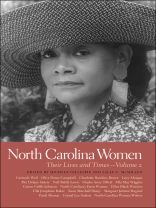By the twentieth century, North Carolina’s progressive streak had strengthened, thanks in large part to a growing number of women who engaged in and influenced state and national policies and politics. These women included Gertrude Weil who fought tirelessly for the Nineteenth Amendment, which extended suffrage to women, and founded the state chapter of the League of Women Voters once the amendment was ratified in 1920. Gladys Avery Tillett, an ardent Democrat and supporter of Roosevelt’s New Deal, became a major presence in her party at both the state and national levels. Guion Griffis Johnson turned to volunteer work in the postwar years, becoming one of the state’s most prominent female civic leaders. Through her excellent education, keen legal mind, and family prominence, Susie Sharp in 1949 became the first woman judge in North Carolina and in 1974 the first woman in the nation to be elected and serve as chief justice of a state supreme court. Throughout her life, the Reverend Dr. Anna Pauline ‘Pauli’ Murray charted a religious, literary, and political path to racial reconciliation on both a national stage and in North Carolina.
This is the second of two volumes that together explore the diverse and changing patterns of North Carolina women’s lives. The essays in this volume cover the period beginning with women born in the late nineteenth and early twentieth centuries but who made their greatest contributions to the social, political, cultural, legal, and economic life of the state during the late progressive era through the late twentieth century.
Yazar hakkında
ANN SHORT CHIRHART is an assistant professor of history at Indiana State University.












